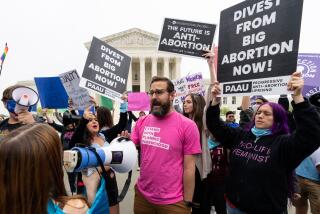U.S. Defends Its Abortion Counseling Ban
- Share via
WASHINGTON — Poor women and teen-agers who become pregnant and go to a federally funded family planning clinic do not have a right to be told that abortion is an option for them, the Bush Administration said Friday in a brief filed with the Supreme Court.
Rather, the government can insist that doctors steer a pregnant woman and “her unborn child” to “appropriate prenatal” care, the brief said.
This federal directive to promote childbirth and to ignore abortion does not violate the free speech rights of doctors or the abortion rights of women, the Justice Department contended.
U.S. Solicitor General Kenneth Starr also used the opportunity to again call on the Supreme Court to overturn the 1973 Roe vs. Wade decision affirming the right to abortion. “We continue to believe that Roe was wrongly decided and should be overruled,” Starr told the justices.
But the bulk of the brief concerned federal regulations governing 4,500 family planning clinics funded by the federal government. Each year, these clinics serve about 5 million poor women who are seeking contraception, pregnancy testing or counseling.
By law, Congress has forbidden the use of these federal funds to pay for abortion. But, in 1988, the Ronald Reagan Administration went a step further and decreed that health care workers in the clinics could not counsel pregnant women that abortion is an option or refer them to abortion clinics.
This fall, the Supreme Court will consider a challenge to those regulations. Doctors and women’s rights groups say the regulations, now enforced by the Bush Administration, exceed the law and violate the Constitution.
The case raises much the same issue presented by the controversy over the National Endowment for the Arts and offensive artwork: How far can the government go in regulating the free speech of someone it subsidizes?
Harvard law professor Laurence H. Tribe, in the challenge to the regulations filed last month, said the Bush Administration has turned a law subsidizing a broad array of family planning services “into an ideological device for distorting vital medical information.” Poor women who go to a clinic for advice emerge “not merely enlightened but affirmatively misled,” Tribe wrote.
But the Justice Department said the government “can selectively fund a program to encourage certain activities that are in the public interest without encouraging other activities that a private individual wishes to promote.” In this instance, the government “may make a value judgment favoring childbirth over abortion,” the brief stated.
Earlier this year, two federal appeals courts split on this issue. The Boston-based appeals court for New England struck down the regulations as unconstitutional, but the New York-based appeals court upheld them. In November, the Supreme Court will hear arguments in the case of Rust vs. Sullivan, 89-1391.
More to Read
Get the L.A. Times Politics newsletter
Deeply reported insights into legislation, politics and policy from Sacramento, Washington and beyond. In your inbox twice per week.
You may occasionally receive promotional content from the Los Angeles Times.











